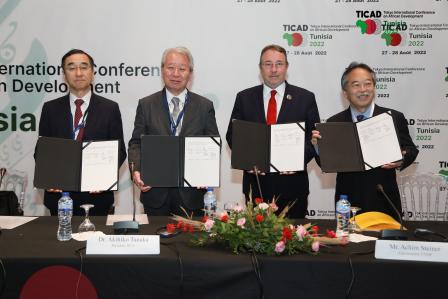At the conclusion of the 8th Tokyo International Conference on African Development (TICAD 8) hosted in Tunisia, the United Nations Development Programme (UNDP) welcomes a comprehensive package of support from Japan to drive economic growth, digital innovation, green transition and create jobs as the continent grapples with a series of challenges that threaten to undo many of the development gains achieved in recent years.
“The impacts of the global food, energy and finance crises are rippling through communities across the globe. These cost-of-living spikes are having a particularly pronounced effect on the Continent of Africa where millions of people now face hunger and famine in regions like the Horn of Africa and the Sahel as climate-change-induced drought takes hold at the same time,” says UNDP Administrator, Achim Steiner. “At this crucial moment, TICAD8 and its business forum have mobilized fresh development partnerships with the private sector that aim to generate additional investment in some African countries: helping to drive green economic growth defined by new jobs and better livelihoods as well as much-needed measures to tackle a climate crisis that is hitting faster than expected.”
Fourty-eight African representatives, including 20 Heads of States and governments, and top leadership at the African Union Commission participated in the two-day Summit held in Tunisia from 27-28 August as well as the United Nations, development banks and public and private sector representatives. They agreed on a series of joint priorities to support Africa’s development revolving around three pillars: economy, society and peace and security.
A total of US$30 billion in public and private financial contributions were announced at the high-level meeting, including continuation of a $4 billion investment through Japan’s Green Growth Initiative for Africa to help address climate change on the continent. Additionally, a new US$130 million facility was announced, to support efforts to address food insecurity across the continent as the ongoing war in Ukraine impacts food and fuel supplies. Japan also announced US $1.5 billion support to tackle vaccine inequity through the COVAX programme and US$1.08 billion to the Global Fund that will help address Africa’s vaccine shortages.
“The Tunis Summit and Declaration has reinforced a new trajectory for TICAD – one in which the private sector’s role must be elevated in fostering inclusive growth and sustainable development,” said Ahunna Eziakonwa, UNDP Assistant Administrator and Regional Director for Africa. “In such times of socioeconomic uncertainty, Africa’s partnership through TICAD can contribute to turning challenges into opportunities. The continent is moving away from an era of aid dependence, to the age of trade and investment – led growth. TICAD can be part of this shift to accelerate Africa’s sustainable development.”
The Japan External Trade Organization (JETRO) and the Japan International Cooperation Agency (JICA), together with the UNDP and the United Nations Industrial Development Organization (UNIDO) launched a new partnership to enhance trade and investment between Japanese and African private sector businesses.
“With its unique emphasis on African ownership, TICAD has become increasingly important for African countries and businesses alike. It remains one of the most innovative platforms for shaping international development collaboration with countries across the continent,” said Khalida Bouzar, UNDP Assistant Administrator and Regional Director for Arab States. “We are happy to work with Japan and TICAD partners to help countries in Africa build forward better after COVID-19, capitalizing on the great resilience and innovation they have demonstrated in responding to the pandemic.”



